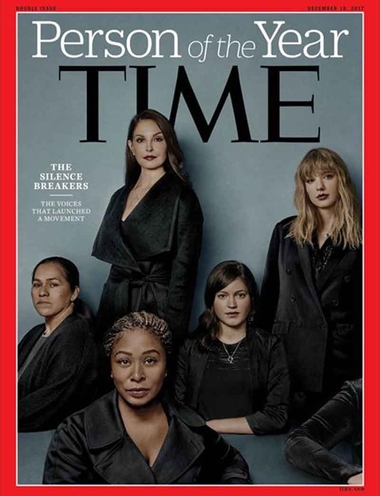2017: The year of (certain) women's voices

2017 was the year of the "Silence Breaker," but women in many industries are still keeping quiet about workplace sexual harassment.
Most of the public attention was on women who spoke up about sexual misconduct in the media or tech industries. But the world has yet to hear from as many women working in less affluent fields.
"I think there is something to the privilege of certain industries that allows some of those women to give voice to what's happening to them," said Laphonza Butler, president of SEIU Local 15, a labor organization for long-term care workers.
Related:
Ashley Judd says ‘tipping point’ here on sexual harassment
Anita Hill chairs entertainment industry effort to combat sexual misconduct
Ellen Page says director outed her, condemns sexual harassment as ubiquitous

Butler noted that women in Hollywood and Silicon Valley are more likely than other women to have the financial security to weather the potential consequences of speaking out. Speaking out about harassment is an economic security issue.
"If you're a woman who's making on average, in California, $10.08 as a caregiver, you can't afford to miss one paycheck, let alone the time it takes for a case like this to be litigated and processed," Butler said. "In my experience with these women ... they don't have any idea what recourse looks like that doesn't punish them."
In construction, where jobs pay well but don't require a college education, experts say that reporting harassment often alienates women from their coworkers.
Although legal remedies are available to women who are harassed, "because of the nature of construction culture, you're probably giving up your livelihood in construction if you file a complaint," said Meg Vasey, executive director of Tradeswomen Inc., a grassroots support organization for women in the trades. Vasey previously worked as a construction electrician for 37 years.
Jessica Stender, senior staff attorney at Equal Rights Advocates, said that harassment in blue collar jobs is "so rampant" and yet "the money is too good to not put up with it."
"You can make a good living, support a family," she said. "You don't feel comfortable going to work [but] you have to put up with it because you have to get paid."
Female health care workers are up to 16 times more likely than workers in other industries to have some kind of violent encounter with a patient or client, according to research by a George Washington University associate professor. And 88% of female construction workers experienced sexual harassment on the job compared to 25% of the general workforce, according to a 2014 study by the U.S. Department of Labor.
"The stakes for [these women] individually are just as high, if not higher," said Jennifer Reisch, legal director of Equal Rights Advocates, a nonprofit dedicated to protecting and expanding civil rights for women.
Unlike Hollywood, tech or politics, the perpetrators of sexual misconduct in other fields are far less likely to have "big names." So speaking out isn't likely to garner an army of supporters across the country -- especially when there are so few women in the trades. It's not easy to prove discrimination, and without the court of public opinion on their sides, making a case against a coworker or a boss can be lonely and burdensome.
There were very few major stories in 2017 about blue collar women speaking out. In one, 70,000 female farm workers signed a letter to show solidarity with the actresses and other victims. And a recent New York Times investigation uncovered years of harassment at a Ford motor plant in Chicago.
In the wake of #MeToo, blue collar workers started a hashtag of their own: #whataboutus.
Harassment in any industry can be difficult to prove -- and that challenge, Vasey said, is "multiplied a lot" for blue collar workers. There are few women in the industry to begin with, and even fewer in positions of power.
Some smaller contractors still say that they don't want any female workers because they don't want any trouble, Vasey said.
"This is a moment where we can do more," Vasey added.
By Sara Ashley O'Brien and Julia Carpenter, CNN Money. The-CNN-Wire ™ & © 2017 Cable News Network, Inc., a Time Warner Company. All rights reserved.
The Gayly – December 28, 2017 @ 11:20 a.m. CST.





